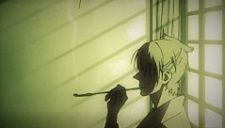|
If you liked
Saraiya Goyou
|
...then you might like
Onihei
|
Both are similar tonally. Also, the main protagonist is complicated in both series. Expect a great samurai show out of the both; they are masterpieces for those who like slow pacing and human/mature characterization.
|
If you liked
Cowboy Bebop
|
...then you might like
Onihei
|
Onihei and Cowboy Bebop do not fit conventions of a serial (episodic show). Essentially, they both discard the format for normal plots. The score is also very good for both. Onihei has a jazzy score, similar to what you'd expect from Shinichiro Watanabe, or other Western influenced directors. Although they are sequential in timeframe, they seem to drift. The reason why they both seem this way is because a plot is secondary to the tone. Each episode is a pseudo-standalone, with its own premise. This elicits a mood of relaxation, and it's ultimately very refreshing. Also, doing this makes the whole series feel more unified. Cowboy Bebop is a classic; in a few years, likely so will Onihei. I imagine if you like one, you'll like the other. Note: Onihei is a great rendition of samurai culture.
|
If you liked
Cowboy Bebop
|
...then you might like
Devilman: Crybaby
|
Both are very stylistic and irreverent. Although they have very different tones, they are similar in pacing.
|
If you liked
Akira
|
...then you might like
Memories
|
Both are older sci-fi movies, and masterpieces. The appeal is similar for both, as the content is jointly dark and engaging. However, the movies diverge in format. Memories is an anthology series, while Akira only has one plot, thus their narratives are very different.
|
If you liked
Sakamichi no Apollon
|
...then you might like
Ping Pong the Animation
|
Despite differences, Kids on the Slope mirrors Ping Pong by being about the same thing. Behind the facades of ping pong and jazz music, both deal with relationships and the difficulties associated with them. They are both very honest in their approach toward the content. They differ, mainly, in their approach. Kids on the Slope is much more conventional, while Ping Pong, being directed by Yuasa, arguably has more style. Both are masterpieces, but Ping Pong is definitely more distinguishable of the two series.
|
If you liked
Samurai Champloo
|
...then you might like
Saraiya Goyou
|
Same genre (historical/adventure) and content (life of samurai). Saraiya Goyou is similarly dreamy, and emotive. Samurai Champloo is noted for style, irreverence, and blunt surrealism (beatboxing in historical Japan?). On the other hand, House of Five Leaves as a historical samurai series is more true to form. Also, it is inarguably more sophisticated. In my opinion, House of Five Leaves is better, but both are great series.
|
If you liked
Kaiba
|
...then you might like
Casshern Sins
|
Both are self-contained. Questions what existence means: existential thought. Plot-wise Kaiba is more unconventional, while the pacing in Casshern Sins is relatively linear.
|
If you liked
Koukaku Kidoutai
|
...then you might like
Kaiba
|
Ghost in the Shell and Kaiba both are ambitious in scope. Kaiba most notably for the art. Both take similar approaches at world-building; they contain an epic and realistic setting. Both GITS and Kaiba are slower paced and philosophical. Both contain existentialist thinking.
|
If you liked
Kemonozume
|
...then you might like
Kaiba
|
Kemonozume was created by the same director as Kaiba (Masaaki Yuasa). So, the art is very similar. These shows also flaunt that very specific brand of off-the-wall style you can expect from Yuasa. My opniom is that Kaiba is a better series, but Kemonozume is not bad.
|
If you liked
Kaiba
|
...then you might like
Saraiya Goyou
|
Both Saraiya Goyou (House of Five Leaves) and Kaiba have a slower pace. The way the shows unravel are similar as well, being chronological and episodic. Both shows are also fairly cerebral, likely Saraiya Goyou more so. If you are a fan of one, most likely you will be a fan of the other.













